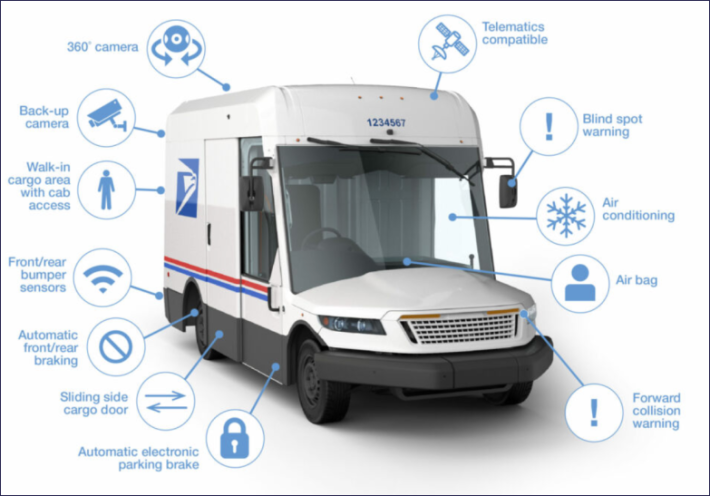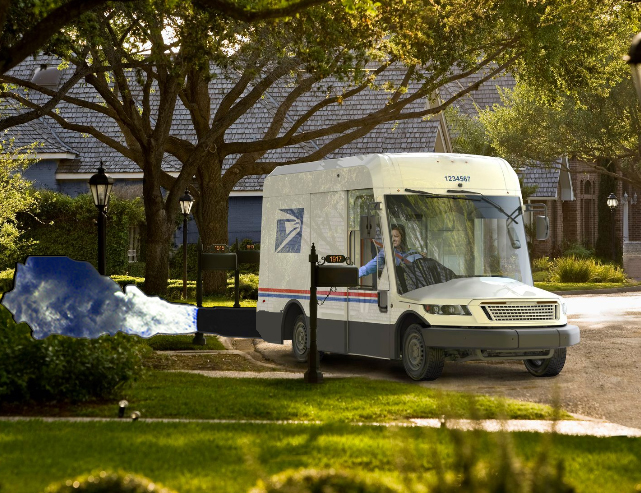Signed, sealed and (almost) delivered.
The United States Postal Service — under fire from environmental groups — is no longer moving ahead with a plan to almost entirely replace its aging delivery fleet with gas-fueled trucks.
According to a posting on the USPS website quietly uploaded today, the agency will raise the target percentage of new electric vehicles in the fleet from just 10 percent to 50 percent. And instead of rush purchasing 165,000 new "Next Generation Delivery Vehicles" — 90 percent of them gas-powered — the Postal Service will reduce its order to 50,000.
Taken together, with new vehicles already purchased and those to be made, 40 percent of the 84,500 new vehicles will be electric.
Environmentalists — or at least environmental groups that see electric cars and trucks as a victory for the environment — hailed the change in tack.
“The U.S. Postal Service finally got the message that cleaner vehicles are a win all around," said Britt Carmon, federal clean vehicles senior advocate at the Natural Resources Defense Council, which strongly backs electric vehicles. "Investing in more electric vehicles will deliver cost savings for the postal service, cleaner air for communities across the nation, and lower emissions for all of us.”
Carmon pointed out, of course, that the decision to slowly electrify the fleet is "not nearly enough."
"To save money and protect our health, the Postal Service should go much further and electrify most of its fleet," he added. "As time goes on and the costs of these vehicles continue to fall, we fully expect that USPS will eventually increase the number of electric vehicles it buys.”

The saga began in January, when the Postal Service quietly announced in the federal register that it would purchase an almost entirely gas-powered fleet to replace its aging delivery trucks. At the time, the Postal Service defended its fossil-fueled fleet as necessary because of financial considerations.
“While we can understand why some who are not responsible for the financial sustainability of the Postal Service might prefer that we acquire more electric vehicles, the law requires us to be self-sufficient,” Kim Frum, a spokeswoman for the Postal Service, told the New York Times. “For that reason, given our current financial condition, the total cost of ownership of our delivery vehicle fleet must be a part of our analysis.”
NRDC was among the groups that objected, saying that the Postal Service plan was based on undisclosed and unsupported assumptions about the environmental impacts of gas-powered vehicles and the cost of buying and operating electric vehicles. NRDC and the United Auto Workers sued to force the USPS to use accurate information which then justified the purchase of tens of thousands more electric vehicles — and to get the purchase of EVs up to nearly 100 percent. (Sixteen states, 14 of which have Democratic governors, also sued.) The Environmental Protection Agency estimated the climate damages that would be caused by the gas-powered fleet at $900 million the Times reported.
"[Postmaster General] Louis DeJoy's gas-guzzling fleet guarantees decades of pollution with every postcard and package," Scott Hochberg, an attorney with the Center for Biological Diversity, yet another group that sued, told NPR at the time. DeJoy is a holdover from the Trump Administration.
In its statement on Wednesday, the Postal Service subtly acknowledged that it was wrong about the financing.
"The Postal Service reiterates its commitment to the fiscally responsible roll-out of electric-powered vehicles for America’s largest and oldest federal fleet," the agency said. "New Next Generation Delivery Vehicles are expected to start servicing postal routes in late 2023." The current fleet is about 230,000 vehicles.
After initial publication of this story, the Postal Service responded and referred Streetsblog to a line in the federal register posting that says the Postal Service now expects to be able to buy electric vehicles, yet stay in the budget, because of "the expected increased availability of BEV options in the future."
The announcement by the Postal Service still ignores the potential of electric cargo bicycle and tricycle delivery, which studies show can slash emissions by roughly one-third compared to electric cargo vans, particularly in dense cities where mail routes are short.
Many citizens of Germany, Australia, and the Netherlands already receive their post by e-bike, and North American advocates have long argued that they’re an under-utilized tool in the country’s fight to clean up the transportation sector — particularly in cities that are already building the protected infrastructure necessary to support safe bike delivery.
As of January, just 49 of the 231,579 delivery routes USPS runs are currently completed by bicycle, all of which are limited pilots in Florida and Arizona.






